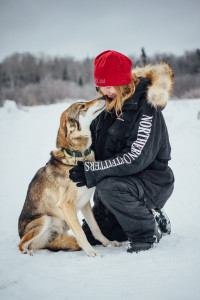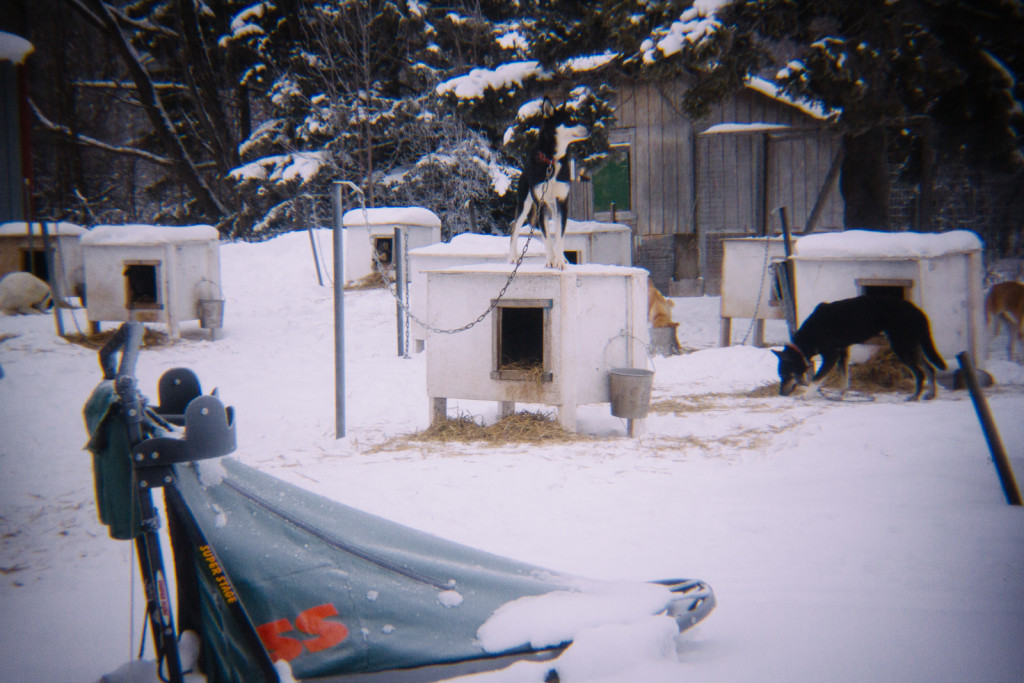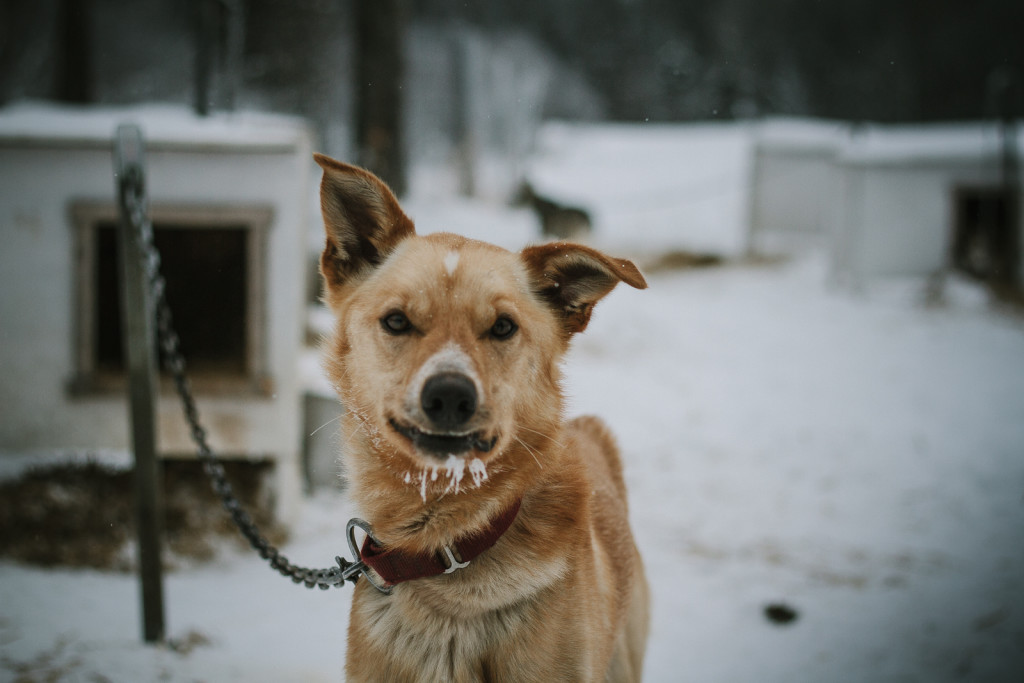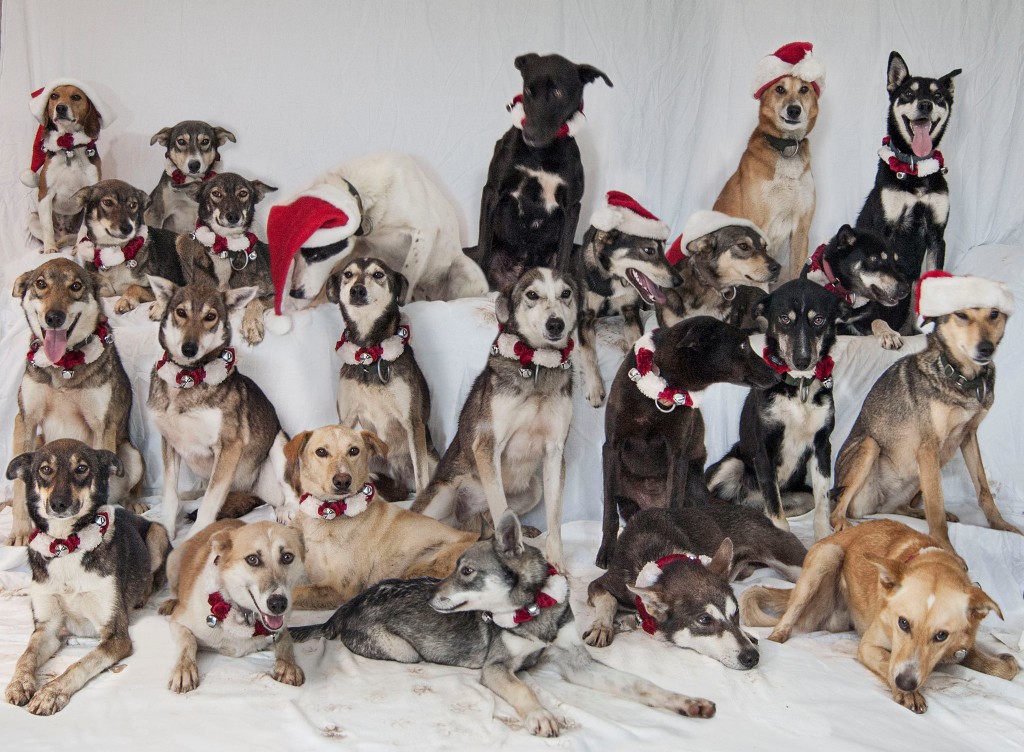 When it comes to mushing, Liza walks the walk, no doubt, but doesn’t necessarily have the appearance of an Iditarod-bound sled-dog musher. When dressed for mushing, the 95-pound 26-year-old is swallowed by her heavy down jacket, complete with wolf-fur hood. The heavy-duty boots she wears to keep her feet warm and dry for days on end weigh nearly 10 percent of her body weight. She’s light for a musher, but that really just makes it easier on her dogs.
Liza lives on a farm in Skandia, where she is training her team of 22 sled dogs to race locally this season and, ultimately, in the Iditarod in 2017. For mushers across the world, the Iditarod is the masochism crème de la crème, and Liza is preparing appropriately by racing in the wilds of the Upper Peninsula this season.
After a rough UP 200 in 2014 and an even rougher Midnight Run in 2015 (is it really possible to define a race in the dead of winter in the UP as anything but “rough?”) Liza has been preparing for the biggest race of her life both mentally and physically, particularly by focusing her energy on this season’s races, including Marquette’s UP 200, which falls on the weekend of February 12.
“We’re doing lots of long runs, lots of checkpoints, and long trips to show the dogs that they’re not always going to be home when they’re sleeping,” Liza said about her young team, including a new lead dog. “That can be a big mental block for them — they’re physically fit but it’s just getting past the mental blocks, making them know that they can do this and just preparing them the best that I can to make them know that they can do it and it’s actually not that bad.”
With the UP 200 only a few weeks away — and the Iditarod looming in the near future — Liza has focused heavily on her dog’s mental capacity for what is required in longer, tougher races. The UP 200 is a fifth of the size of the Iditarod, but being that it’s consistently the toughest race of the season for Liza, it’s become the perfect training ground for her and her dogs.
When it comes to mushing, Liza walks the walk, no doubt, but doesn’t necessarily have the appearance of an Iditarod-bound sled-dog musher. When dressed for mushing, the 95-pound 26-year-old is swallowed by her heavy down jacket, complete with wolf-fur hood. The heavy-duty boots she wears to keep her feet warm and dry for days on end weigh nearly 10 percent of her body weight. She’s light for a musher, but that really just makes it easier on her dogs.
Liza lives on a farm in Skandia, where she is training her team of 22 sled dogs to race locally this season and, ultimately, in the Iditarod in 2017. For mushers across the world, the Iditarod is the masochism crème de la crème, and Liza is preparing appropriately by racing in the wilds of the Upper Peninsula this season.
After a rough UP 200 in 2014 and an even rougher Midnight Run in 2015 (is it really possible to define a race in the dead of winter in the UP as anything but “rough?”) Liza has been preparing for the biggest race of her life both mentally and physically, particularly by focusing her energy on this season’s races, including Marquette’s UP 200, which falls on the weekend of February 12.
“We’re doing lots of long runs, lots of checkpoints, and long trips to show the dogs that they’re not always going to be home when they’re sleeping,” Liza said about her young team, including a new lead dog. “That can be a big mental block for them — they’re physically fit but it’s just getting past the mental blocks, making them know that they can do this and just preparing them the best that I can to make them know that they can do it and it’s actually not that bad.”
With the UP 200 only a few weeks away — and the Iditarod looming in the near future — Liza has focused heavily on her dog’s mental capacity for what is required in longer, tougher races. The UP 200 is a fifth of the size of the Iditarod, but being that it’s consistently the toughest race of the season for Liza, it’s become the perfect training ground for her and her dogs.
 “We train on a lot of the trails for the UP 200, so I know when a lot of the stupid things are coming up — weird crossings, narrow trails, sketchy bridges, hard turns,” she said. “But at the same time, when we have to leave that trail, the dogs know where home is, and they always think they should take the trail home. I have to tell them that dinner is in Marquette, and if they want dinner they have to go the unfamiliar route.”
Having been mushing for five years now, Liza is full of anecdotes about getting knocked off her sled by howling Lake Superior winds or having her eyes frozen shut during a particularly cold Midnight Run at the UP 200 last season. In that race, she wasn’t even aware that she had crossed the finish line until her dogs came to a stop. She later learned that both of her lead dog’s eyes were frozen as well, meaning that they were running only in the direction that their noses told them to.
She’s gone nearly sleepless for three-day periods, has subsisted on beef sticks, cheese and granola bars, and has cared for sore paws at checkpoints in the wee hours of the morning. She even sleeps on the ground with her dogs, in only a sleeping bag, so she can tend to them throughout the night. She was given a can of pop on the last stretch of the UP 200 two seasons ago, only to have it freeze to her mitt, forcing her to finish the race with one mitten frozen to a Pepsi can. When she speaks about races or crazy experiences or her team of dogs, rosy cheeks always give way to enthusiastic smiles, giving her an air of pride — of motherhood, almost — when tending to or talking about her team.
Especially during races, Liza rarely has time to think of herself, so indulging in something as simple as brushing her teeth is enough to boost morale and prepare her for the day. That’s where “Mother Musher” (and owner of the property where Liza trains and lives) Carol Wiater comes in.
“Carol always leaves a mini toothbrush in my dropbox, and I’ve never been so excited about a toothbrush as I am in a race,” Liza said. “I wake up and I get that minty fresh breath, and I suddenly don’t feel like a slum bag anymore. Even though I’m still a slum bag, just with minty-fresh teeth.”
“We train on a lot of the trails for the UP 200, so I know when a lot of the stupid things are coming up — weird crossings, narrow trails, sketchy bridges, hard turns,” she said. “But at the same time, when we have to leave that trail, the dogs know where home is, and they always think they should take the trail home. I have to tell them that dinner is in Marquette, and if they want dinner they have to go the unfamiliar route.”
Having been mushing for five years now, Liza is full of anecdotes about getting knocked off her sled by howling Lake Superior winds or having her eyes frozen shut during a particularly cold Midnight Run at the UP 200 last season. In that race, she wasn’t even aware that she had crossed the finish line until her dogs came to a stop. She later learned that both of her lead dog’s eyes were frozen as well, meaning that they were running only in the direction that their noses told them to.
She’s gone nearly sleepless for three-day periods, has subsisted on beef sticks, cheese and granola bars, and has cared for sore paws at checkpoints in the wee hours of the morning. She even sleeps on the ground with her dogs, in only a sleeping bag, so she can tend to them throughout the night. She was given a can of pop on the last stretch of the UP 200 two seasons ago, only to have it freeze to her mitt, forcing her to finish the race with one mitten frozen to a Pepsi can. When she speaks about races or crazy experiences or her team of dogs, rosy cheeks always give way to enthusiastic smiles, giving her an air of pride — of motherhood, almost — when tending to or talking about her team.
Especially during races, Liza rarely has time to think of herself, so indulging in something as simple as brushing her teeth is enough to boost morale and prepare her for the day. That’s where “Mother Musher” (and owner of the property where Liza trains and lives) Carol Wiater comes in.
“Carol always leaves a mini toothbrush in my dropbox, and I’ve never been so excited about a toothbrush as I am in a race,” Liza said. “I wake up and I get that minty fresh breath, and I suddenly don’t feel like a slum bag anymore. Even though I’m still a slum bag, just with minty-fresh teeth.”  Liza’s lack of indulgence seems to be a theme, especially in long races when she can hardly think beyond the needs of her dogs enough to let her mind wander.
“When I’m racing, all I look at are dog butts,” she said laughing. “I’m running 22 dogs, I’ve got 44 ears, 22 heads, 22 bodies, 22 tails and 88 feet to look after. There is no time for my mind to wander. I’m always watching, making sure everything is in rhythm and if the rhythm is off, something is wrong, so I have to stop and check. When you fail to check, you end up with problems.”
Watch and see if Liza can keep her rhythm at the UP 200 this February 12 For more info click up200.org
Liza’s lack of indulgence seems to be a theme, especially in long races when she can hardly think beyond the needs of her dogs enough to let her mind wander.
“When I’m racing, all I look at are dog butts,” she said laughing. “I’m running 22 dogs, I’ve got 44 ears, 22 heads, 22 bodies, 22 tails and 88 feet to look after. There is no time for my mind to wander. I’m always watching, making sure everything is in rhythm and if the rhythm is off, something is wrong, so I have to stop and check. When you fail to check, you end up with problems.”
Watch and see if Liza can keep her rhythm at the UP 200 this February 12 For more info click up200.org
 -Words By Amanda Monthei with cover photo by Aladino Mandoli
-Words By Amanda Monthei with cover photo by Aladino Mandoli

